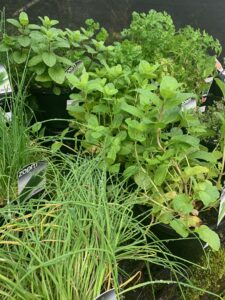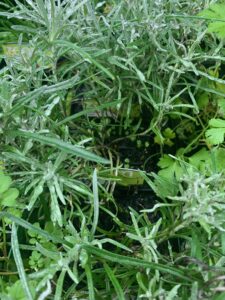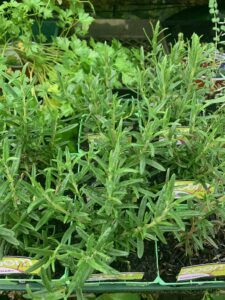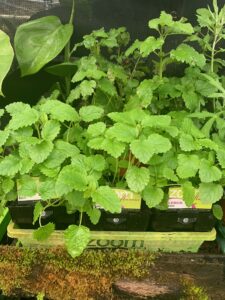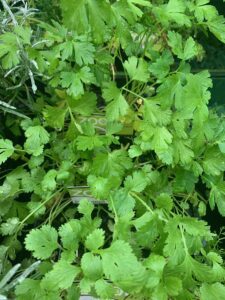Herbs are simple and rewarding to grow for culinary and medicinal uses. The majority enjoy full sun or just a little bit of shade and will perform well in the ground or pots. Good drainage is very important. Some pungent herbs serve as a deterrent for bugs and some are beneficial as companion plants in the vegetable garden.
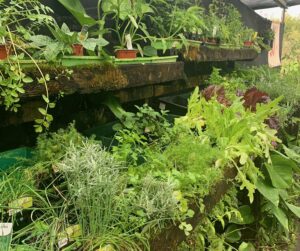
Frequently grown herbs include Rosemary, Basil, Mint, Chives, Parsley, Oregano, Thyme, Curry Plant, Coriander, Dill, Fennel, Lemongrass. Wormwood.
Basil
Grow basil in a well-drained position in full sun. The plants like the warmth and can get a bit of leaf rot and fungus if left in a cool damp place. Basil is a good companion plant for tomatoes and also goes well with them in cooking. Keep picking the tips or pruning and you will get a bigger crop and it won’t go to seed as fast. Makes a great pesto!
Chives
Chives are a perennial in the onion family. They grow from small bulbs and are clumping and grass-like with strappy leaves. They will self-seed and quickly spread through your garden but it is easy to pull them out if they grow in an unwanted position. They prefer well-drained soil, but take very little maintenance once established. Great for adding flavour in all sorts of cooked dishes as well as eaten fresh in salads or on sandwiches. Try the garlic chives for the garlic, onion mix!
Coriander
Many people struggle to grow coriander in our area. It is more of a temperate climate herb, but if situated well you can grow it year-round. In summer, try planting in a shaded part of the garden. It will go to seed if stressed so water well. The seeds are a great culinary spice so if your plant goes to flower don’t just pull it out. The flowers are also excellent for attracting beneficial insects. Coriander prefers to be grown in the ground as it has a long taproot.
Dill
Dill is an annual herb growing up to a metre. It is hardy but because of its wispy, fern-like leaves, it needs some protection from the wind and loves full sun. A good attractant for beneficial insects, it is also self-seeding. Both the leaves and seeds are edible, with the leaves often used for flavouring fish and potato salads. The seeds are somewhat similar in taste to caraway.
Fennel
Fennel is a very diverse herb. Its leaves, seeds, stem and bulbs can all be consumed; however, you must choose between the seeds and bulb as once the plant goes to seed, the flavour of the bulb is ruined. The seeds and leaves have an anise taste, often used as a mouth freshener after meals in many Asian countries. The bulbs can be sliced and used instead of onion when frying. Grow in full sun in deep, well-drained soil. It needs a fair amount of space and develops a large root system so it is not the best for pots or containers. It will cross-pollinate with other plants and this can reduce flavour.
Lemon Balm
This tasty herb is a mixture of lemon and mint. It grows well all year in a semi-shaded position with rich, well-drained soil. It is a herb that likes to be pruned so harvest continually, plucking fresh leaves as needed. Taste is best freshly picked and not dried. Great on chicken and fish but only add at the end of the cooking process. Makes an excellent tea, good for soothing and relaxing the nerves after a big day or when feeling under the weather.
Mint
Do not plant mint in the ground. Containers only! It has underground runners that are impossible to get rid of and will spread quickly, taking over your whole garden. Mint can be grown year-round but will need plenty of water over the hotter months. A partly shaded position is ideal to prevent the leaves from burning.
Oregano
Oregano is an easy to grow, ground covering herb. It likes full sun and doesn’t need rich soil – in fact, good soil can reduce its flavour. Oregano likes well-drained soil because it can be prone to root rot and mould in humid areas. Does well in containers and will send out runners. often used in Italian cooking, it increases in flavour when dried. An essential in any spaghetti bolognese!
Parsley
Parsley is an easy, fast-growing herb that is well suited to the sub-tropics. It likes full sun or a partly shaded position in rich, well-drained soil. Parsley does well in containers or planted straight into the ground. It is considered biannual so given the proper care, it will keep giving for two years before going to seed. It is rich in vitamins and minerals and comes in two varieties, curl-leafed or Italian.
Rosemary
Rosemary likes a hot, dry climate and is not tolerant of frosts. It can also tolerate some salt air so can be planted close to the beach but keep it in a well-drained, open area as it can struggle under high humidity. It is a perennial, evergreen with aromatic foliage and attractive flowers, growing to about a metre. Great on roast lamb and roasted vegetables.
Sage
A perennial herb, best grown in a dry, sunny position. Sage does not like wet feet and will get root rot if left in heavy soils, so plant it in well-drained soil. It is hardy and can adapt to non-fertile soils. It is versatile in the kitchen and also has a variety of medicinal uses. There are a number of edible varieties, some with a glorious scent such as the pineapple or fruit-scented sage.
Stevia
Stevia rebaudiana, commonly known as sweetleaf, sugarleaf or just stevia, is a herb native to subtropical and tropical regions of America. The leaves can be eaten fresh or added to teas and food as a sugar substitute. Extract from the leaf is sweeter than sugar and has been used commercially over the past few decades. Unlike sugar, it is not a carbohydrate and does not raise blood sugar levels. Grow in well-drained soil in full sun in warm climates. Plants will grow to around half a metre and leaves may be dried like any other herb.
Tarragon
Tarragon is another easy-to-grow herb that is not too fussy about soil requirements. It does, however, like well-drained soil and can be slightly susceptible to fungus and moulds. In a hot climate, it is ideal to give it a bit of protection from the afternoon sun. French tarragon is the go-to variety, offering a mild anise flavour that goes well with most things, especially chicken. It makes a good companion plant.
Thyme
Thyme is a perennial herb with small leaves and flowers and a strong, fragrant aroma. Ideally, plant in full sun in dry soil. Can be grown in pots and containers or in the garden. Both the leaves and the flowers are edible and are used commonly in stews and casseroles and Italian cooking. Comes in a variety of cultivars with lemon thyme and the ordinary garden variety the most common.

